how to train a horse to lay down
24 May How to Teach a Horse to Lay Down: Step-By-Step Guide
Contents
Teaching Your Horse to Lay DownAre you looking for a cool trick to teach your horse? Teaching your horse to lay down is both a challenging yet signature trick for advanced horse training. There are many different methods for teaching your horse to lay down; I’ve found a method that isn’t forceful on the horse and is relatively simple to teach. In this article, I will share the easy steps I have learned to help teach your horse to lay down.So, how do you teach a horse to lay down? Here are five simple steps to follow when teaching your horse to lay down:Reading: how to train a horse to lay down
- Step 1: Teach Your Horse to Lower Its Head
- Step 2: Teach Your Horse to Pick Up All Four Feet On Command
- Step 3: Teach Your Horse to Step Its Hind Feet Under Itself
- Step 4: Teach Your Horse to Lift Its Front Leg
- Step 5: Combine the Previous Steps To Ask Your Horse to Lay Down
All in all, it took me about a month to teach my horse to lay down following these steps. I’m sure with more consistency. you could do it in a shorter amount of time. Although this method takes longer than some other methods out there, it is a method that helps the horse understand exactly what you’re asking for rather than just forcing the horse to do something. Keep reading to get an in-depth look at each step and more tips for helping your horse learn to lay down on cue.
Step 1: Teach Your Horse to Lower Its Head
The first step in teaching your horse to lay down is getting your horse to lower its head to the ground. When teaching your horse to lay down, you will first teach your horse four individual cues before combining them together to ask your horse to lay down. These cues can be taught in whichever order you like, as long as the horse is responsive when it comes time to combine them. The first cue I personally teach is getting my horse to lower its head.
How Does the Horse Lowering Its Head Correlate With the Horse Laying Down?
If you’ve ever watched your horse lay down and roll in the pasture, you’ve probably noticed how the horse will first lower its head and sniff the ground before it lays down. If you watch closely, you’ll also notice how the horse’s head stays low to the ground during the entire process of them laying down. Getting your horse to lower its head to the ground is a vital clue to your horse that its time to start thinking about laying down.
How Do You Teach the Horse to Lower Its Head?
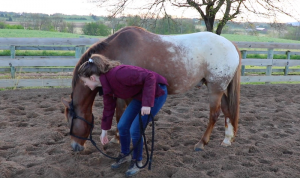
Step 2: Teach Your Horse to Pick Up All Four Feet On Command
Teaching your horse to pick up all four feet on command will be very helpful when it comes time to teach your horse to lay down. in order to get your horse to lay down, you’ll have to be able to control what each foot of the horse does. Keep reading to see how I teach this to my horses.
How Does the Horse Picking Up Its Feet on Command Correlate With Getting the Horse to Laying Down?
If you’ve ever watched a horse roll in the pasture, you’ve probably noticed that before they lay down, the steps their hind feet under themselves, pop up a front leg, and go onto their knee to get to where they are laying on the ground. When it comes to training your horse to lay down, part of helping them understand what you’re asking comes from what they are doing with their feet.If you can get your horse to pick up its feet the way it does when it goes to lay down, it will help your horse start to realize what you’re asking it to do. While this process does take longer than a training method that uses force to get the horse to lay down, this method helps the horse think through the process and put two-and-two together.
How Do You Teach the Horse to Pick Up Its Feet On Command?
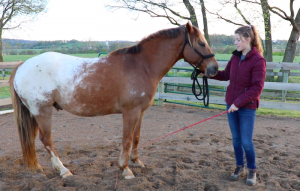
Step 3: Teach Your Horse to Step Its Hind Feet Under Itself
Now that you have control of your horse’s feet, it’s time to ask your horse to steps its hind feet under itself. I call this step the “circus elephant,” because when your horse does this correctly, they will look like a circus elephant standing on a podium. Their hind feet will be standing right behind their front feet, making them look compacted and like they are teetering on the edge of a cliff.
How Does the Horse Stepping Its Hind Feet Under Itself Correlate With Getting the Horse to Laying Down?
Read more: how to extend mirrors on gmc 2500As mentioned in the step above, when you watch your horse lay down in the pasture, see how close the horse steps its hind feet behind its front feet before it lays down. When the horse has its hind feet under itself, it can help the horse balance better as it goes to lay down. The horse can now drop its front-end since its weight is focused on its hind-end.
How Do You Teach the Horse to Step Its Hind Feet Under Itself?
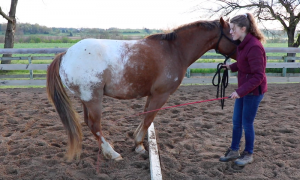
Tips For Helping Your Horse Learn How to Step Its Hind Feet Under Itself:
Once you can get your horse to responsively step its hind legs under itself on cue, its time to start working at having the front legs stay still so you can get that “circus elephant” look. To do this, simply halt your horse in front of a ground pole and ask for the cue. The ground pole will help to deter the horse from stepping its front legs forward.
Step 4: Teach Your Horse to Lift Its Front Leg
The last individual step you will teach your horse is to lift up its front leg. Many horses like to paw or lift their leg in front of them, but when it comes to getting your horse to lay down, you’ll want them to lift their leg up directly under themselves, as if you were picking out its hooves.
How Does the Horse Lifting Its Front Leg Correlate With Getting the Horse to Laying Down?
When watching a horse lay down, notice what their front end does; The horse will usually pick up one of its front-feet before bucking its knees and laying down. I teach my horses to pick up one front leg to encourage the horse to start throwing its weight onto its hind end and bringing its front end to the ground.
How Do You Teach the Horse to Lift Its Front Leg?
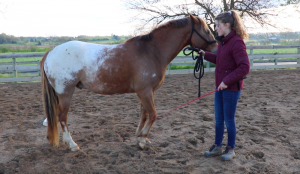
Step 5: Combine the Previous Steps To Ask Your Horse to Lay Down
Once you have mastered each of the individual cues, it’s time to put it all together. At this point in the process, It’s important that you shouldn’t expect your horse to lay down, although some may try to. When you start combining each cue, the horse is going to start to realize that the cues are mimicking what they do when they lay down.Work on combining the different cues and making different combinations. Have your horse step its hind feet under itself then pop up its knee. Have your horse bring its head to the ground while stepping its hind feet forward. During this step, you’ll also be able to get a clear understanding of whether or not there are cues you need to review. If your horse is having a hard time combining particular cues, go back, and review each cue separately.
Getting Your Horse to Lower Its Head While Moving Its Feet
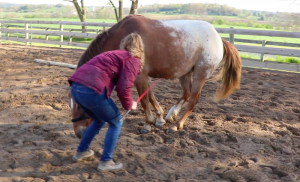
Step 6: Know How to Ask Your Horse to Lay Down
Now that you’ve worked on combining the individual cues for asking your horse to lay down, it’s time to actually ask your horse to lay down. It’s important to know that your horse may not lay down instantly during this step, but they may make moves to do so. The horse may buckle its front knees as if it were going to attempt to lay down; the horse may even start to swish its tail and try and turn in little circles as you give the cue, as this is what horses do when they are thinking about laying down.It’s important to reward even the smallest try; if you see signs that your horse is even thinking about laying down, the horse should be rewarded by releasing the pressure of the cue and allowing them to take a breather. These steps can be hard for your horse both physically and mentally, so allowing them a break is the best reward you can give.
Ask Your Horse to Lay Down
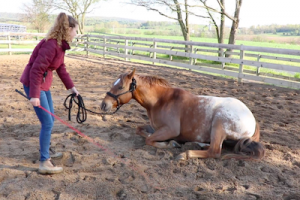
Important Things to Know
In the Beginning, Give All the Cues From the Same Side
When you first teach your horse to lay down, give all your cues from the same side. By standing at your horse’s shoulder and using your lunge whip to cue, this is easily doable. By focusing on cueing from one side, your horse can focus more rather than having to learn the cues on the other side. Horses tend to think “one side at a time,” so if you are working on both sides, it may take the horse longer to comprehend what you’re trying to teach them.Once you’ve mastered asking for your horse to lay down on one side, you can try the other side. In my experience, the cues translate well on the other side if your horse has been responsive with the cues on the first side.
Give Your Horse a Proper Release When Training
The most important thing to know when teaching your horse to lay down is how to correctly reward your horse. As prey animals, horses can only be truly rewarded by a release of pressure. This means when your horse responds correctly, you release the pressure you’re applying. By doing this, the horse can truly understand what you are trying to communicate.The steps used in teaching your horse to lay down can be difficult for your horse to do physically and mentally. If you don’t reward them with a proper release, they can quickly become frustrated or overwhelmed. I only work on cues for a few minutes at a time before I allow the horse a break by walking them around the arena. This walk helps them take a break and relax for a minute before we go back into practice.
Don’t Expect Your Horse to Learn This in a Day
One thing you must realize about teaching your horse to lay down with this method is that it isn’t going to happen in a day. Overall, it took me about a month for me to teach my horse, Tucker, to lay down. I wasn’t always consistent, so if I would have worked on it every day, I’m sure we would’ve completed it much faster.Like humans, every horse is different and learns at their own speed. If you rush your horse through the steps, they aren’t going to be ready to lay down when you ask. They must fully grasp your cues and what you expect them to do before they can correlate your cues with lying down. Patience is your biggest friend when teaching your horse this trick.
Find a Nice Soft Area For Your Horse to Lay Down
Make sure you find a nice soft area for your horse to lay down. I taught my horse to lay down in a sanded arena; I figured that the sand would make a soft bed for the horse and tempt it to lay down and roll. A hard uncomfortable surface can discourage your horse from laying down, so make sure you find a surface that’s inviting.
Use Water to Help Encourage Your Horse to Roll
If you’ve been working for a while on your final step and your horse can effectively combine the individual cues but they don’t seem to be comprehending what you’re asking for, try hosing your horse off with water and then asking for the lay down. A wet coat plus a sanded arena will be tempting for your horse to lay down and roll in.I had to do this with my horse to help him understand what I was asking for. With a wet coat, he quickly realized the cues I was giving were asking him to lay down. From then on, he can do the trick with no problem, even with a dry coat.Like I mentioned earlier, every horse is different and certain things may help them learn better. Using water can help your horse correlate your cues with laying down.I hope this article was helpful to you in teaching your horse to lay down! This is a fun trick to be able to do with your horse, and it will definitely impress your friends and family. If you’re more of a visual learner, the video below will walk you through the steps covered in this article:If you’re looking for more things to do with your horse, check out these articles:
- How to Make Your Horse Love You: Complete Guide.
- 5 Best Groundwork Exercises For Your Horse
- Lunging a Horse in a Round Pen: How-To Guide For Beginners
- Teaching Your Horse to Neck Rein: Step-By-Step Guide
P.S. Save this article to your “Horse Tricks” board!Read more: How to throw strikes in baseball
Last, Wallx.net sent you details about the topic “how to train a horse to lay down❤️️”.Hope with useful information that the article “how to train a horse to lay down” It will help readers to be more interested in “how to train a horse to lay down [ ❤️️❤️️ ]”.
Posts “how to train a horse to lay down” posted by on 2021-10-28 22:30:46. Thank you for reading the article at wallx.net





